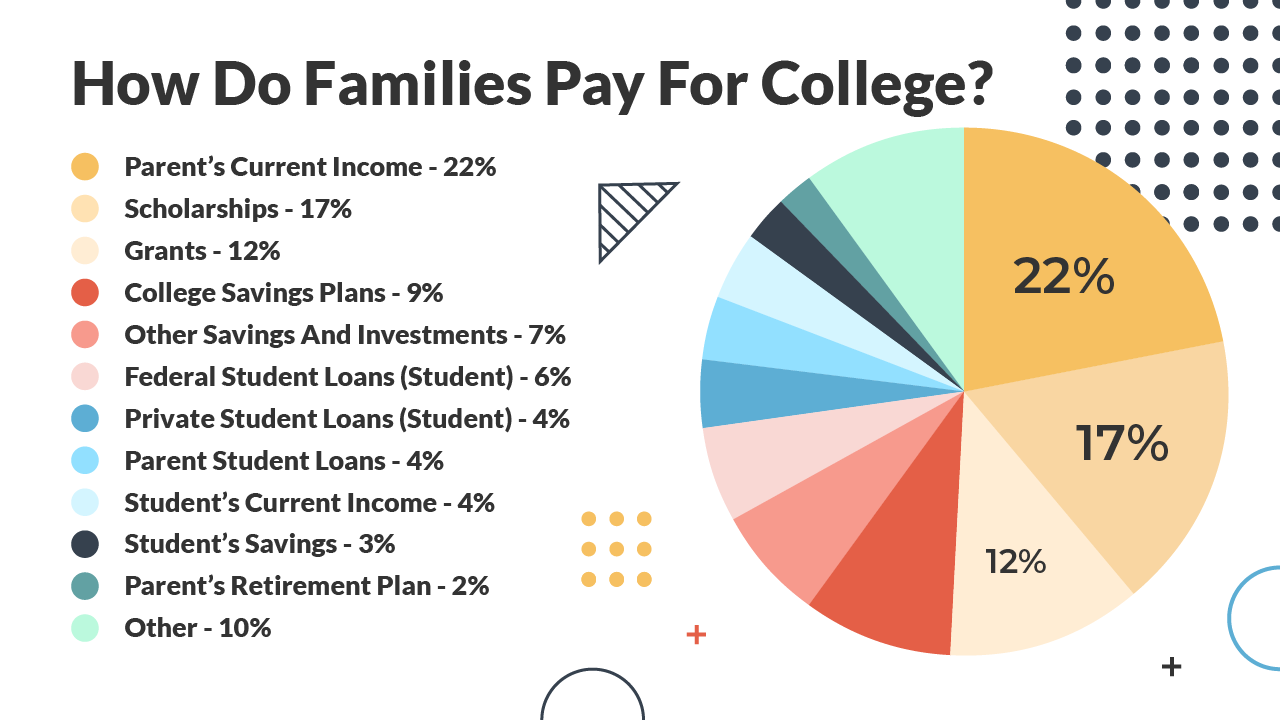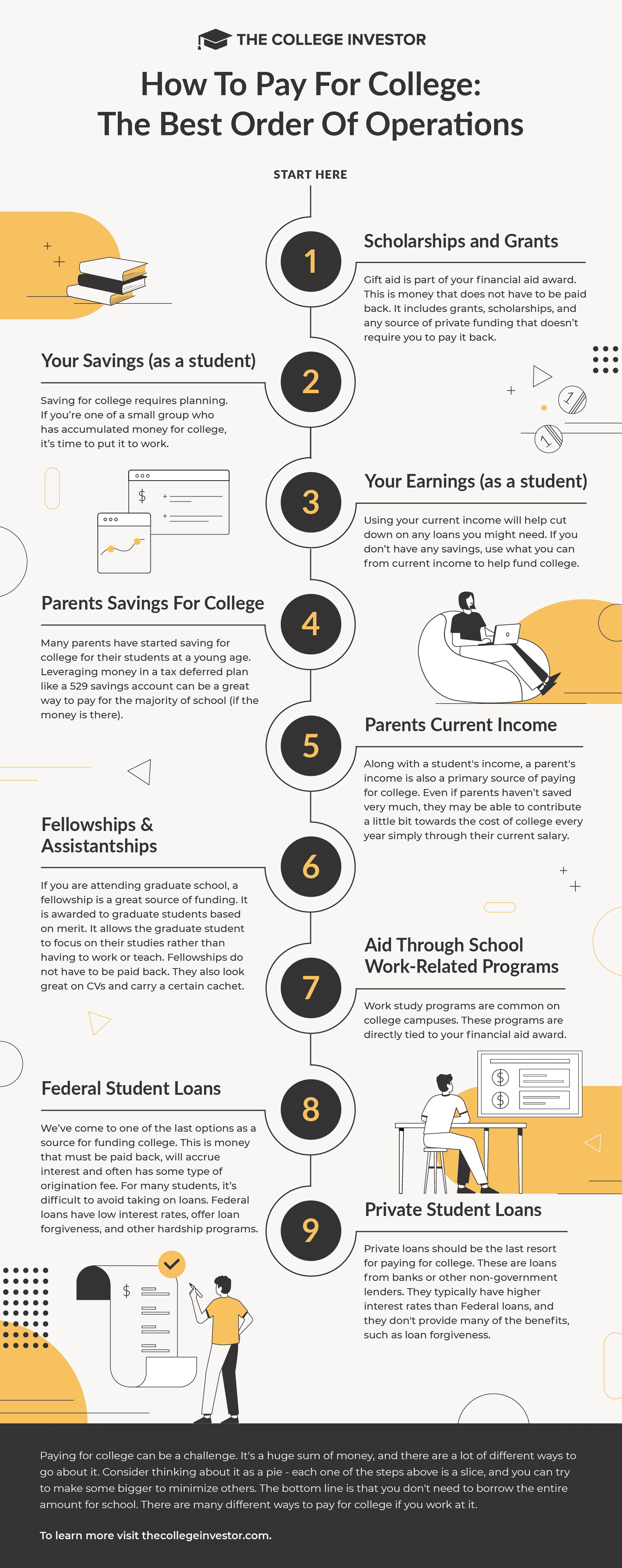
Figuring out how to pay for college can often lead you to think that student loans are your only choice. Think again!
Although many students rely on student loans, they should be the last resort. Student loans accrue interest, have long repayment periods, and can put families into financial hardship.
In fact, a study from the OneWisconsin Institute finds that it takes graduates of Wisconsin universities 19.7 years to pay off a bachelor's degree and 23 years to pay off a graduate degree.
Before you take out student loans, you should know that there are other ways to pay for college. We list them in order, from best to worst. Start with the top group and work your way down to the last (i.e., worse) option, which is student loans. By following this guide, there’s a chance you can reduce the amount of student loans needed to finance college. For a lucky few, they may find student loans are not even necessary.
Here's our take on the 'best' order of operations to pay for college. It's important to note that this is more like a "pie" than a strict order. The more you can contribute from the "earlier" slices, the less you'll have to borrow. And there is no "strict" rules here - but you should definitely use free money before other funds.
In fact, according to the latest statistics on how families pay for college, here is how that pie looks in real life:

1. Scholarships and Grants
Gift aid is part of your financial aid award. This is money that does not have to be paid back. It includes grants, scholarships, and any source of private funding that doesn’t require you to pay it back.
Of course, it depends on getting your FAFSA submitted on time.
Some students might realize a large amount of scholarships and grants. Others might not be able to get as much.
Don't forget to apply for private scholarships and grants as well - don't just depend on your school. This sounds crazy, but I recommend high schoolers apply to at least 50 scholarships. This even is true if you're planning on being a part-time student.
To make it easy, we also have this guide to Scholarships and Grants By State.
Check out these guides:
2. Your Own Savings (as a student)
Saving for college requires planning. If you’re one of a small group who has accumulated money for college, it’s time to put it to work.
Maybe you've been saving your graduation money, or you've received birthday funds over time. Maybe grandma even left you some money to pay for college when you were younger.
If you have your own student savings, using it to pay for college is a great first step.
3. Your Earnings (as a student)
Additionally, using your current income will help cut down on any loans you might need. If you don’t have any savings, use what you can from current income to help fund college.
A lot of people forget that they can earn money before going to school (i.e. the best summer jobs for college students), or even work full time during school.
I personally worked full time while going to university. I worked five days per week - Monday, Wednesday, and Friday nights, and during the day on Saturdays and Sundays. I tried to schedule my classes for Tuesday and Thursday, or if necessary, before work on the other days.
Don't know about ways to earn as a student? Check out our 100+ Ways To Make Money In College.
4. Parents Savings For College
Next on the list is any money your parents may have put aside for school. This could be in the form of a 529 college savings account, or other savings vehicle.
Many parents have started saving for college for their students at a young age. Leveraging money in a tax deferred plan like a 529 savings account can be a great way to pay for the majority of school (if the money is there).
Parents might also have other savings set aside for their child. It's important to have conversations about parental contributions early, so that everyone involved in the "paying for college" debate knows what to expect.
Pro Tip: Here's our guide to properly structuring your 529 plan distributions.
5. Parents Current Income
Along with a student's income, a parent's income is also a primary source of paying for college. Even if parent's have saved very much, they may be able to contribute a little bit towards the cost of college every year simply through their current salary.
Some parents may be able to contribute much more than others, but every little bit that can be sent in to avoid borrowing for school is a huge win.
Note: Some states give tax deductions or tax credits for 529 plan contributions. You can contribute and withdraw in the same year in most states - making it potentially worthwhile to use your current income to contribute to a 529 plan, then pay for college from there.
See our guide: 529 Plan Rules By State.
6. Fellowships and Assistantships
If you are attending graduate school, a fellowship is a great source of funding. It is awarded to graduate students based on merit. It allows the graduate student to focus on their studies rather than having to work or teach. Fellowships do not have to be paid back. They also look great on CVs and carry a certain cachet.
“It’s basically the Harry Potter scar on your forehead indicating you’re an amazing scholar,” stated Meredith Drake Reitan, associate dean for graduate fellowships at the USC Graduate School.
“The fellowship program is about research potential,” she said. “Faculty members might say, ‘They’re not ready to apply to for the NSF Fellowship because their research hasn’t quite jelled.’ But that’s actually right where the NSF wants them — it’s designed to be an early career accelerator.”
The takeaway: don’t think you aren’t qualified for a fellowship. They are certainly worth applying to. Speak with your educational counselor or advisor about how and which ones may have the highest potential for successful acceptance.
7. Aid Through School Work-Related Programs
We continue down the list and come to work-related programs that are meant to provide a flexible schedule around your classes. At this point, you’ve exhausted all forms of funding that don’t require work exchange or loans. We’re now moving into funding sources that will require some sort of payback.
Work studies are common on college campuses. These programs are usually tied into your financial aid award. They allow you to work on campus within a flexible schedule. Pay is usually minimum wage, but you can’t beat the flexible schedule provided by these programs. While it is a smaller source of funding, depending on your class schedule, it might be the only type of job you can take on.
Assistantships are usually reserved for graduate students. These programs are similar to work studies except they are teaching positions. Often the student will teach lower-level classes in areas they are very familiar with.
Check out our guide to Federal Work-Study Programs.
8. Federal Student Loans
We’ve come to one of the last option as a source for funding college. This is money that must be paid back, will accrue interest and often has some type of origination fee. For many students, it’s difficult to avoid taking on loans.
Federal loans have a fairly low interest rate, which often does not exceed the single digits. As reported by StudentAid.gov, loans first disbursed on or after July 1, 2024 and before July 1, 2025 have the following interest rates:
- Direct Subsidized (undergraduate): 6.53%
- Direct Unsubsidized (undergraduate): 6.53%
- Direct Unsubsidized (graduate or professional): 8.08%
- Direct PLUS: (parents and graduate or professional students): 9.08%
In regard to loans for college, you aren’t likely to find a better deal anywhere else.
Don't believe us? Check out the Best Student Loan Rates here.
If you need to get a student loan, here's the process on How To Take Out A Student Loan (Both Federal and Private).
9. Private Student Loans
Private loans are another and final option. These may be loans from banks or other lenders that are non-government. They will typically have higher interest rates than government loans and won’t provide the same advantages such as loan forgiveness, hardship options, and flexible repayment plans.
Private student loans should really be a last resort, and before borrowing, you should really do a full Return On Investment Calculation of your college expenses to even see if college is worth it.
We recommend students shop and compare private loan options before taking them out. Credible is an excellent choice because you can compare about 10 different lenders in 2 minutes and see what you qualify for. Check out Credible here.
You can also see the full list of private student loan options here: Best Private Student Loans.
Infographic
If you agree with this order of operations, share this handy infographic with your friends and family that need to know this:

Final Thoughts
Paying for college can be a challenge. It's a huge sum of money, and there are a lot of different ways to go about it. Even those most expensive colleges have the potential to be significantly more affordable with financial aid.
I like to think about it as a pie - each one of the steps above is a slice, and you can try to make some bigger to minimize others.
The bottom line here is that you don't need to borrow the entire amount for school. There are many different ways to pay for college if you work at it.

Robert Farrington is America’s Millennial Money Expert® and America’s Student Loan Debt Expert™, and the founder of The College Investor, a personal finance site dedicated to helping millennials escape student loan debt to start investing and building wealth for the future. You can learn more about him on the About Page or on his personal site RobertFarrington.com.
He regularly writes about investing, student loan debt, and general personal finance topics geared toward anyone wanting to earn more, get out of debt, and start building wealth for the future.
He has been quoted in major publications, including the New York Times, Wall Street Journal, Washington Post, ABC, NBC, Today, and more. He is also a regular contributor to Forbes.
Editor: Clint Proctor Reviewed by: Ashley Barnett